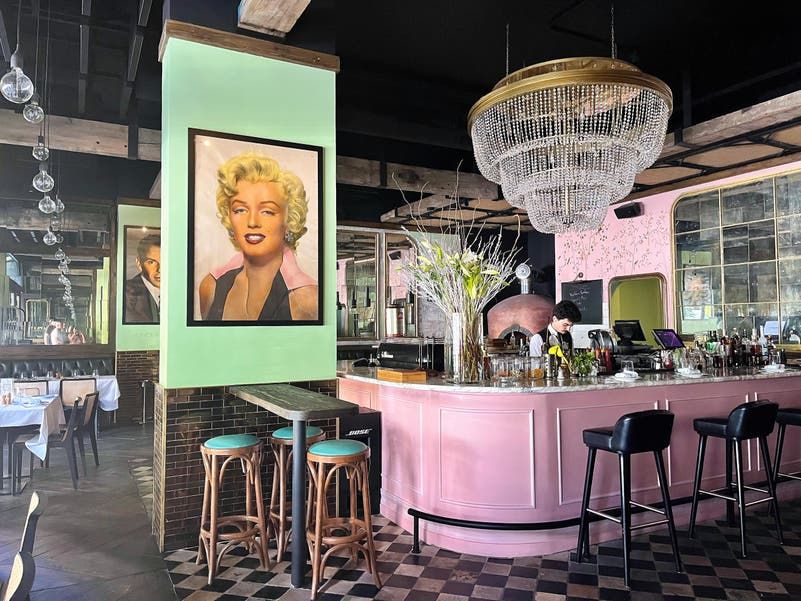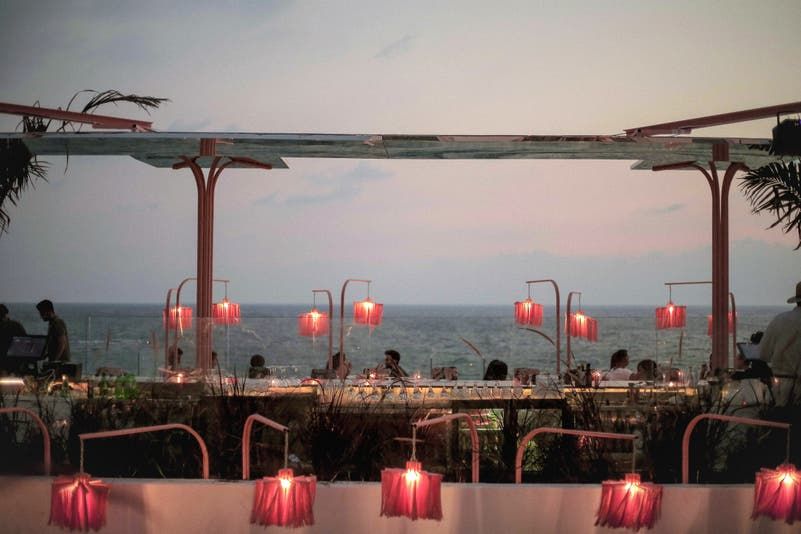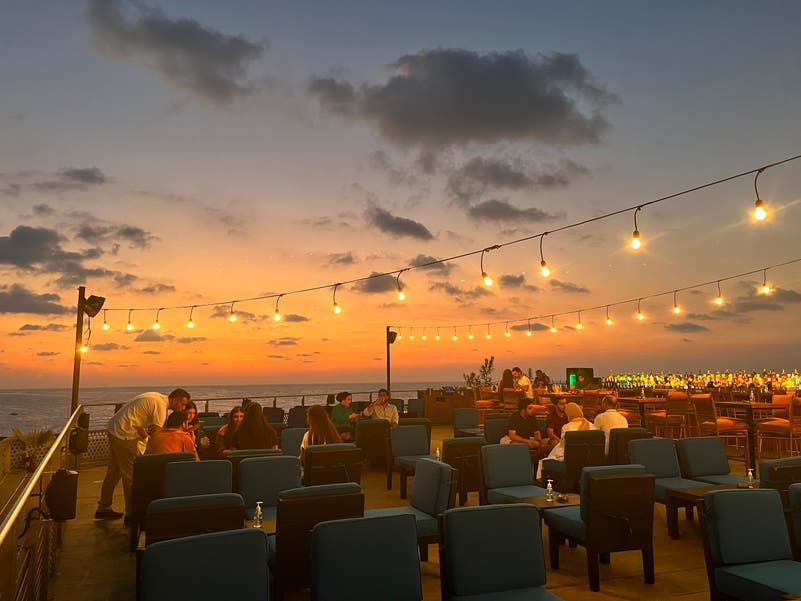
Lebanon’s dining scene rides summer boom
Lebanon’s restaurant scene is experiencing a boom this summer, despite the deep economic crisis. Eateries and cafes are packed, with many new outlets opening in the last few months, hoping to take advantage of the influx of expats visiting.
Lebanon has long been known as the cuisine capital of the region, enjoying a varied and high-quality culinary landscape. The economic crisis, pandemic and 2020 Beirut port explosion forced many businesses to close, but now stylish, fine-dining restaurants are filling the gap.
One such place is Japanese Hawaiian French fusion restaurant Niu, which opened in Batroun last month. The venue offers a luxury experience of fresh seafood, sushi and steaks, crafted from imported ingredients like truffles and Scottish salmon.
Since opening, the seaside venue has been fully booked, with plans already in the works to open a second branch in Beirut’s Zaitouna Bay next month.
“It's about really trying to push the boundaries of the creation. We're quite hopeful, from a purely economic standpoint, that the country is expanding,” Niu owner Claude Tabar told Al Arabiya English. “It was a very informed decision, based on observation of how the country is functioning, of last summer's performance, of all the businesses that were catering for the upscale segment. Today, we have more than 70 percent of our customers who are living and working in Lebanon.
“There are always pockets of businesses that are growing in the midst of crisis and hardship of the economy, completely isolated from everything else,” he added. “And the belief is that, in Lebanon, this pocket of hope is actually way bigger than other developing countries.”
 Beirut’s Avanti, opened in May, and serves classic Italian dishes and
specials featuring Cameroonian prawns, lobster or black cod.
Beirut’s Avanti, opened in May, and serves classic Italian dishes and
specials featuring Cameroonian prawns, lobster or black cod.
Show me the money
Restaurants like Niu can thrive by catering to the so called ‘one percent’ – people who are earning completely or partly in dollars or have access to funds from abroad – as well as targeting tourists and visiting expats.
By charging customers at the market rate, Tabar can pay all his employees in fresh currency, adding them to the ‘one percent’ pool.
“Our chefs are paid around $3000 [per month], the sous chefs about $2,000, which is extremely important to maintain the talent that we have,” Tabar said. “If you're really building a sustainable business, you will have to let go of the mindset that developed in the last few years of thinking: I can pay my employees in lira and I get paid in dollars or dollarized rates. I think very quickly the rest of the industry will have to follow suit.”
Beirut’s Avanti, which opened in May, is an upscale classic Italian spot serving up a range of woodfired pizzas, antipasti like bresaola with fresh mozzarella and specials featuring Cameroonian prawns, lobster or black cod.
The all-day eatery – located in the hotel district opposite the Beirut Waterfront – has both indoor and terrace space, staying open year-round, with a menu that offers both mid-tier and high-end prices, depending on the dish.
Many of the hotels damaged in the blast are expected to reopen within the next year, bringing more traffic to the area and people seeking relaxed street side lunches or cozy dinners in winter.
“We’ve had two years of financial crisis now and then the pandemic. We've had a huge number of restaurants closing. Just in this area, 10 or 12 restaurants closed,” Avanti owner Samir Boubess told Al Arabiya English.
“With the explosion that damaged this area, as well as Ashrafieh and Mar Mikhael, a lot of people just said it's not viable to reopen.
“[Now] there is a gap. We've been open a few months and doing relatively well. I think it’s a signifier of this year's doing slightly better than the last few,” he added. “All our imported ingredients arrive fresh, twice a week, so that we have a big offering which you will not find in another place in Beirut, in a single location.”
 Niu offers Japanese Hawaiian French fusion food.
Niu offers Japanese Hawaiian French fusion food.
Feeding a niche in the restaurant scene
High-end restaurants, charging in dollars, can maintain quality of ingredients and service, as well as pay for imported produce and the increasing fuel prices needed to run their businesses.
Boubess said many small-scale restaurants have lost customers since the crisis began, as they’ve cut corners by using poorer ingredients, offering smaller portions and hiring staff without enough experience, willing to be paid smaller salaries in lira. As a result, fine dining is in demand, as people are willing to pay more for a better experience.
Still, the industry faces challenges, due to the crisis, but also because globally the price of fuel has increased, and the pandemic has affected the supply chain.
“For those with dollars, it’s cheaper – I'm not pricing the same amount of dollars I was charging before the crisis” Boubes said. “For example, an espresso in the past – in this area, which is the most expensive – used to be $3. It's Illy coffee and it always used to be between $3 and $3.30; today, it's sold at $1.75 instead. So yes, I'm charging dollars, but almost half what it used to cost.
“Whatever we used to buy prior to COVID-19 was much cheaper than it is today. There's a problem with Lebanon, because we used to have a lot of items brought by air,” he added. “Today, there aren’t many planes coming to Lebanon, so you have a shorter shelf life for some products, and you have a longer trip, which costs considerably more, imported by freight.”
 The Park lounge at sunset, on top of the Yacht Club in Beirut.
The Park lounge at sunset, on top of the Yacht Club in Beirut.
Sitting on the dock of the bay
Over in Zaitouna Bay, The Park lounge and restaurant has reopened this month, after closing in 2019 due to the crises. Situated on the Yacht Club rooftop, it offers one of the best views in the city and a range of Tex-Mex style food like loaded nachos, burgers, salads and flatbreads with creative toppings.
“We decided to close up to wait for better days and, this year, we did not expect the season to be so good,” owner Michel Elefteriades said. “We had lots of damages [from the port explosion] but, when we saw there were so many people coming from abroad to spend the summer in Beirut, we decided to reopen.
“Every day, we're working on bringing it back the way it used to be, and we have many new items on the menu,” he added. “The prices at The Park are what you would pay for a sandwich or some street food in Europe, so people are coming and they're having a good dinner.”
Elefteriades intends to expand in the coming year and add an Arabic food section to The Park, replacing the damaged kitchen equipment as he goes. Cautiously optimistic, he hopes that by providing good food and an enjoyable atmosphere, he can ride the wave and sustain.
“The big question that everybody is asking in the industry is: What will happen when the people that are coming from abroad will leave?” he mused. “How big of a drop will it be, and will it be sustainable with only the Lebanese living in Lebanon?”
Tabar anticipates that many more low-end restaurants will close in the future, with more high-end outfits opening in their place, catering to customers interested in exceptional culinary experiences. While it may sound harsh to the many Lebanese now under the poverty line, he said that this is the only way such businesses can survive and provide stable income to their employees.
“The next wave is about excellence,” Tabar said. “Whoever can offer this level of service and high quality of their food; these are the businesses who can survive. The ones that can't adapt to this new industry order, I think these are the ones probably going to suffer in the future.”